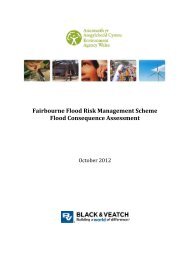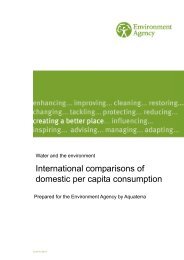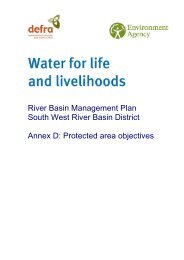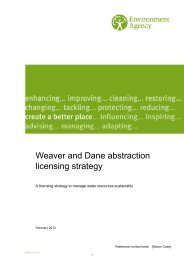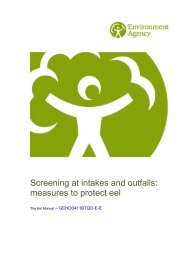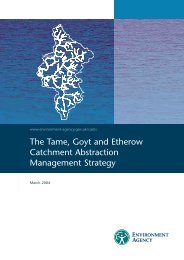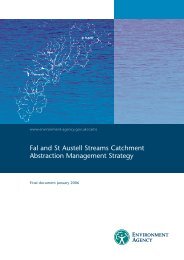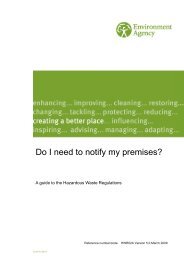preliminary flood risk assessment drain london
preliminary flood risk assessment drain london
preliminary flood risk assessment drain london
Create successful ePaper yourself
Turn your PDF publications into a flip-book with our unique Google optimized e-Paper software.
Climate changes can affect local <strong>flood</strong> <strong>risk</strong> in several ways. Impacts will depend on local<br />
conditions and vulnerability.<br />
Wetter winters and more of this rain falling in wet spells may increase river <strong>flood</strong>ing in both rural<br />
and heavily urbanised catchments. More intense rainfall causes more surface runoff, increasing<br />
localised <strong>flood</strong>ing and erosion. In turn, this may increase pressure on <strong>drain</strong>s, sewers and water<br />
quality. Storm intensity in summer could increase even in drier summers, so we need to be<br />
prepared for the unexpected.<br />
Rising sea or river levels may increase local <strong>flood</strong> <strong>risk</strong> inland or away from major rivers because<br />
of interactions with <strong>drain</strong>s, sewers and smaller watercourses.<br />
There is a <strong>risk</strong> of <strong>flood</strong>ing from groundwater-bearing chalk and limestone aquifers across the<br />
district. Recharge may increase in wetter winters, or decrease in drier summers.<br />
Where appropriate, we need local studies to understand climate impacts in detail, including<br />
effects from other factors like land use. Sustainable development and <strong>drain</strong>age will help is to<br />
adapt to climate change and manage the <strong>risk</strong> of damaging <strong>flood</strong>s in future.<br />
Adapting to Change<br />
Past emission means some climate change is inevitable. It is essential we respond by planning<br />
ahead. We can prepare by understanding our current and future vulnerability to <strong>flood</strong>ing,<br />
developing plans for increased resilience and building the capacity to adapt. Regular review<br />
and adherence to these plans is key to achieving long term, sustainable benefits.<br />
Although the broad climate change picture is clear, we have to make local decisions against<br />
deeper uncertainty. We will therefore consider a range of measures and retain flexibility to<br />
adapt. This approach, embodied within <strong>flood</strong> <strong>risk</strong> appraisal guidance, will help to ensure that we<br />
do not increase our vulnerability to <strong>flood</strong>ing.<br />
Drawing number 2111-UA002334-BMD-01 illustrates the impact of climate change within the<br />
LBB.<br />
5.4 Impact of Future Development<br />
It is possible that long term developments might affect the occurrence and significance of<br />
<strong>flood</strong>ing. However current planning policy aims to prevent new development from increasing<br />
<strong>flood</strong> <strong>risk</strong>.<br />
In England, Planning Policy Statement 25 (PPS25) xv on development and <strong>flood</strong> <strong>risk</strong> aims to<br />
“ensure that <strong>flood</strong> <strong>risk</strong> is taken into account at all stages in the planning process to avoid<br />
inappropriate development in areas at <strong>risk</strong> of <strong>flood</strong>ing, and to direct development away from<br />
areas at highest <strong>risk</strong>. Where new development is, exceptionally, necessary in such areas,<br />
policy aims to make it safe without increasing <strong>flood</strong> <strong>risk</strong> elsewhere and where possible, reducing<br />
<strong>flood</strong> <strong>risk</strong> overall.”<br />
Adherence to Government policy ensures that new development does not increase local <strong>flood</strong><br />
<strong>risk</strong>. However, in exceptional circumstances the Local Planning Authority may accept that <strong>flood</strong><br />
<strong>risk</strong> can be increased contrary to Government policy, usually because of the wider benefits of a<br />
new or proposed major development. Any exceptions would not be expected to increase <strong>risk</strong><br />
levels which are “significant” (in terms of the Governments criteria).<br />
UA002334 - Drain London— London Borough of Brent PFRA<br />
Hyder Consulting (UK) Limited-2212959 Page 23<br />
o:\frr review monitoring & reporting team\publishing\unknown\brent\brent_par.docx




